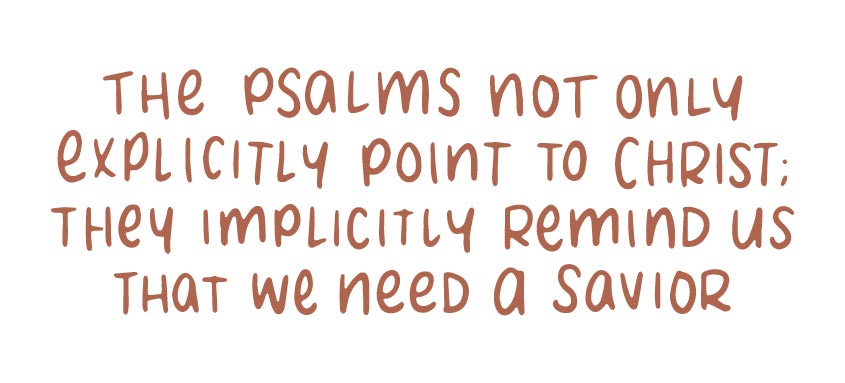“Why, God?”
I had asked this question before, but not like this—not with anger.
IV lines draped over my arms—an unwanted accessory. I watched as the chemo treatment slowly made its way through the tubing—drip, drip, drip—eventually entering my veins. Every drip was like the annoying buzz of an alarm clock.
I thought, This isn’t fair. This isn’t right.
But what I didn’t know then, that I know now, is that my faith was asleep. And it took cancer to wake it up, to bring it to life. It took cancer to make me ask the hard questions of Scripture and find a Savior who never sleeps on me.
I took my questions to God’s Word, specifically the Psalms.
The Psalms Remind Us That We Are Not Alone
The book of Psalms is a collection of 150 songs and poems that span a variety of topics: lament, praise, gratitude, wisdom, etc. Many were songs meant for collective worship, while others were likely written as personal prayers. And that means we can use them to inspire our own personal worship and prayer.
What I love most about the Psalms is that they do not shy away from the feelings that we feel in the day-to-day moments—joy, grief, wonder, frustration, and loneliness. The Psalms teach us how to navigate these feelings even while trusting in God’s goodness and sovereignty.
When you don’t know the words to pray, go to the Psalms. When you need to rest in the comfort of God’s love, go to the Psalms. When you are frustrated with God, go to the Psalms. Each one is packed with truth about who God is and how His character grounds and guides our human experience.

The Psalms Teach Us About God’s Character
As I was in and out of appointments and feeling the effects of chemo, I asked God a lot of questions. But what I learned is that I was not the first one to utter the words, “Why, God?” (Psalm 43) or beg “Listen to me!” (Psalm 5). While I asked these questions, the Psalms taught me truths about God that soothed my questions like rain soothes parched land.
In the Psalms, we are reminded that God does listen to our prayers (Psalm 116:1–2). We are reminded that He is with us and for us (Psalm 23). We are reminded that God is loving (Psalm 136), that He is kind (Psalm 36:7–9), that He is patient (Psalm 103:8), and that He is for our good (Psalm 107). When everything seems out of control, we find that He is in control of all things (Psalm 33). In a world that feels shaky, the truths we read in the Psalms anchor us to His unchanging character. The Psalms help us to know God so that we may love Him.

The Psalms call to mind truths about God that transcend our circumstances. And as we know God’s character through Scripture, we begin to see aspects of God’s character in our own lives and in the lives of those we love. And we learn that there is so much more to the human experience than chaos and calamity; there is the opportunity to awaken our hearts to the love that we are made for—to a God who gives us hope and purpose in a fallen world.
The Psalms Point to Jesus
The Psalms were written in an “in-between” moment of history. God promised a Messiah, but the Messiah had not yet come. And so God’s people were anticipating God’s deliverance. God used the Psalms to tether His people in His character and remind them of their coming Savior.
For example, Psalm 110:1 is the most frequently quoted Old Testament verse that reappears in the New Testament. It reads, “This is the declaration of the Lord to my Lord: ‘Sit at my right hand until I make your enemies your footstool.’” One day, the coming Messiah would hold victory over Israel’s enemies and be enthroned at God’s right hand. This psalm—just one example of the many Messianic references in the Psalms—taught of a future King’s victory.
This future King, this Messiah to come, is Jesus. Hebrews 10:12–13 says, “But [Jesus], after offering one sacrifice for sins forever, sat down at the right hand of God. He is now waiting until his enemies are made his footstool.” Jesus is King enthroned in heaven whose kingdom will know no end. He has defeated the grave and will one day banish sin and its consequences from the earth.

The Psalms not only explicitly point to Christ—they implicitly remind us that we need a Savior. Like a mirror, they reflect a world that is broken and messy and hurtful. They cause us to look forward to the day when our enemies are made a footstool for Jesus, when He returns to usher forth His kingdom in full, when there will be no more tears and no more pain (Revelation 21:4). God will make all things new. Oh, what a glorious day that will be!
Throughout my cancer journey, I memorized Psalm 23, and I would repeat it each time an IV was pushed into my arm. Psalm 23 would be on my lips every time I was tempted to feel forgotten or afraid. Psalm 23 would awaken me to what is true—that my God in heaven is the Good Shepherd who leads me to peaceful meadows and through the darkest valleys. My circumstances told me I was forgotten, but His Word reminded me that goodness and love will pursue me all the days of my life. This is the power of the Psalms.










